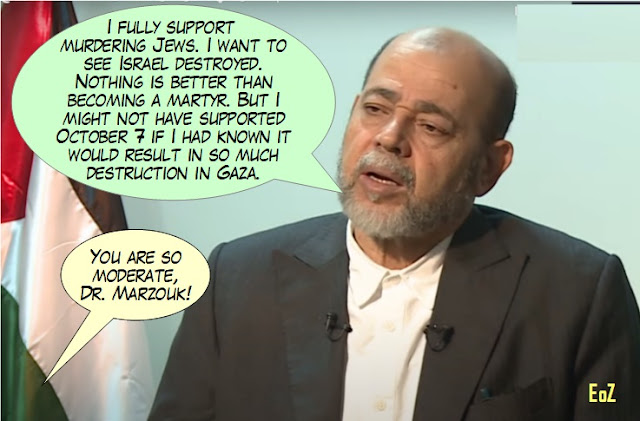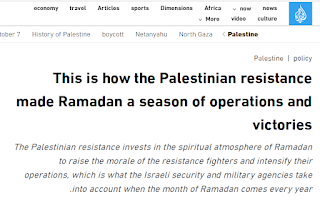Infantilising Palestinians, demonising Israelis
Humanity is certainly in short supply in Perfect Victims. In the chapter, ‘Tropes and Drones’, el-Kurd tells us again and again that his problem is not just with Israel, it is also with Jews. ‘The people seeking to expel us from our neighbourhood were Jewish’, he writes, ‘the bureaucrat issuing and revoking our blue ID cards was a Jew’, and ‘as for the soldiers who were frisking us to check those IDs… most of them [were] Jewish’.How the UN turned Palestinians into permanent refugees
El-Kurd fumes against the Palestinian notables who wrote a joint letter taking issue with Palestine Authority president Mahmoud Abbas’s anti-Semitic comments in August 2023 – when he claimed that Hitler ‘fought’ the Jews because they dealt with ‘usury, money and so on’. El-Kurd claims that ‘defending ourselves, often preemptively, against the baseless charge of anti-Semitism’ is a mistake, a tactic that ‘elevates the history of Jewish suffering… above our present-day suffering’.
El-Kurd is convinced that Israel is illegitimate and that Israeli Jews are ‘colonisers’. Quoting Frantz Fanon, he says ‘the work of the colonised is to imagine every possible method for annihilating the colonist’.
But Israelis are not colonisers. They are refugees from persecution in Europe up to 1945, and in the Arab world since 1948. Most were born in Israel. By characterising Jews as the ‘colonisers’, el-Kurd is lending a veneer of legitimacy to his vilification of an entire people.
El-Kurd refuses to be drawn on the future of the Jews because, he says, this can only ever mean the de-railing of the Palestinian cause. He protests that the ‘possibility of a second holocaust is given primacy over a holocaust happening in the present’ – that is, in Gaza.
It is certainly true that Israel has been fighting a deadly war with Hamas since October 2023. But it is not in any sense a ‘holocaust’. The victims of holocausts do not generally have their own armies, nor fire missiles at their persecutors. El-Kurd points to the ‘countless examples of annihilatory rhetoric’ by Israeli officials, but he could just as easily list the genocidal remarks made by Hamas spokesmen, like Osama Hamdan or Ghazi Hamad.
Moreover, Hamas ran riot in southern Israel for just 18 hours on 7 October 2023, and managed to kill 1,200 people, most of them Jews. Its organisational commitment to killing Jews goes back to its founding. After Hamas’s Al-Qassam Brigades attacked Sderot, Be’eri and other towns bordering on Gaza that awful day in 2023, Mohammed el-Kurd was excited. ‘Much of what is happening in occupied Palestine’, he tweeted on 8 October, ‘will be in future history books as an example of revolutionary struggle’. Like so many among the pro-Palestine crowd, el-Kurd has since downplayed the significance of the massacre, complaining that attention is always on 7 October, not on what came before.
El-Kurd claims that Palestinians are denied the ‘common humanity’ applied to others, and are therefore dehumanised. Yet he ignores the clear dehumanisation of Jews that made it possible for Hamas to slaughter families in their homes on 7 October. That is bad enough, but worse is the evasion of responsibility. It is galling to read him protest against ‘the ceaseless infantilisation of the dehumanised subject’, in reference to Palestinians, when he and his fellow anti-Israel campaigners have done the most to infantilise them. For el-Kurd, Hamas should not be held responsible for its actions – any discussion of its atrocities or brutality, he suggests, is a ‘distraction’. What he ignores is that until a leadership emerges that accepts it has a responsibility to make peace, and live alongside its Jewish neighbours, there is no future for Palestine.
El-Kurd concludes his work like a poet, more than an activist, writing ‘the world is changing because it must’. The world is changing, but not in the direction that Mohammed el-Kurd hopes. Hamas has brought disaster upon Gaza. And the prospect of a durable peace between Israelis and Palestinians looks further away than ever.
To illustrate the absurdity of what has been happening, take the case of Mohamed Anwar Hadid. His father fled Nazareth in 1948 because he ‘did not want the family to live under the Israeli occupation’. He ended up in California where he became a property developer building luxury mansions and hotels in Beverly Hills.Yisrael Medad: Will Palestinians in Gaza get up and go?
You might not have heard of Hadid. But you are likely to have heard of his daughters, supermodels Gigi and Bella Hadid, both of whom are American-born citizens. Bella, who reputedly earns up to $20million a year, regularly posts anti-Israel sentiments on social media, and has been attending pro-Palestine rallies, chanting ‘From the river to the sea’. Amazingly, the two sisters, their father and other members of the Hadid family are all still registered as Palestinian refugees with UNRWA.
That’s not all. Under the auspices of the UN, people of Palestinian heritage the world over don’t just have a permanent refugee status, they also have a so-called right of return.
Over several decades, the ‘right of return’ has allowed successive Palestinian political leaders to continue a war against Israel by other means – by insisting on their right to return to land ‘occupied’ by Israel. No other group of refugees has been granted a similarly inalienable right of return.
For the Palestine Liberation Organisation, this right was the ‘foremost of Palestinian rights’. Hamas is equally attached to it. In 2018, it organised a massive protest along the border fences with Israel. The objective of this ‘great march of return’ was, according to Hamas’s then leader, Ismail Haniyeh, to ‘break the walls of the blockade, remove the occupation entity and return to all of Palestine’. No wonder novelist Amos Oz, the founder of Israel’s Peace Now movement, has argued that ‘the right of return is a euphemism for the liquidation of Israel’.
The twin issues of refugee status and the right of return have taken on enormous symbolic significance for Palestinians. They have also made, and will continue to make, any peace negotiations between Palestinians and Israelis inordinately difficult.
Now would be a good time to start reassessing Palestinians’ permanent refugee status and the right of return. That way we might finally start taking some of the heat out of this interminable conflict.
Ze’ev Jabotinsky began his 1923 “On the Iron Wall” essay by denying that he is “an enemy of the Arabs, who wants to have them ejected from Palestine, and so forth.”
He insisted that “it is not true.” He did admit that, emotionally, his “attitude to the Arabs is the same as to all other nations: polite indifference.”
A veteran of the campaign for equal rights for Jews in the Russian Empire, including autonomous national rights for all nationalities, he wished to see a parallel reality develop in the Mandate for Palestine. He believed that “there will always be two peoples in Palestine.”
Based on that belief, he added: “I consider it utterly impossible to eject the Arabs from Palestine,” and insisted that he would be prepared to take an oath, binding on future generations, “that we shall never do anything contrary to the principle of equal rights, and that we shall never try to eject anyone.” All that, however, was before the 1929 riots, those of 1936 to 1939, and all the wars since.
He set certain basic principles. There must be peace, and it needs to be obtained by peaceful means. There must be a Jewish majority in the future Jewish state. The Arabs need to agree that the Jews belong to their homeland. Responding to whether all this is possible, he wrote: “The answer to this question does not depend on our attitude to the Arabs, but entirely on the attitude of the Arabs to us and to Zionism.”
A century later, Israeli Prime Minister Binyamin Netanyahu, speaking at the Conference of Presidents of Major American Jewish Organizations in mid-February, said: “Why not give Gazans a choice? … Over the last couple of years … 150,000 Gazans left. … If people want to leave, if they want to emigrate, it’s their choice. And I think President [Donald] Trump’s plan is right on the dot.”
In other words, they should have freedom of movement and the right to emigrate.
Netanyahu could have added that some 70% of Palestinians in Gaza consider themselves “refugees.” As such, they are planning to move away from Gaza in any case. Of course, their desired destination is Israel—with the aim of eradicating the Jewish state, a purpose they adopted as a life’s mission since 1947 when they rejected that year’s U.N. Partition Plan in a not very peaceful manner.
Many of them continued to pursue their aim during the 1950s in the ranks of the fedayeen when they engaged in cross-border raids of theft, destruction and murder. A new phase of their “armed struggle” resumed after the Sinai Campaign with the founding of the Palestinian Liberation Organization (PLO) in 1964. In 1987, Hamas was established, designated a foreign terrorist organization by the United States and other countries.





 Buy
Buy 







































.jpg)





